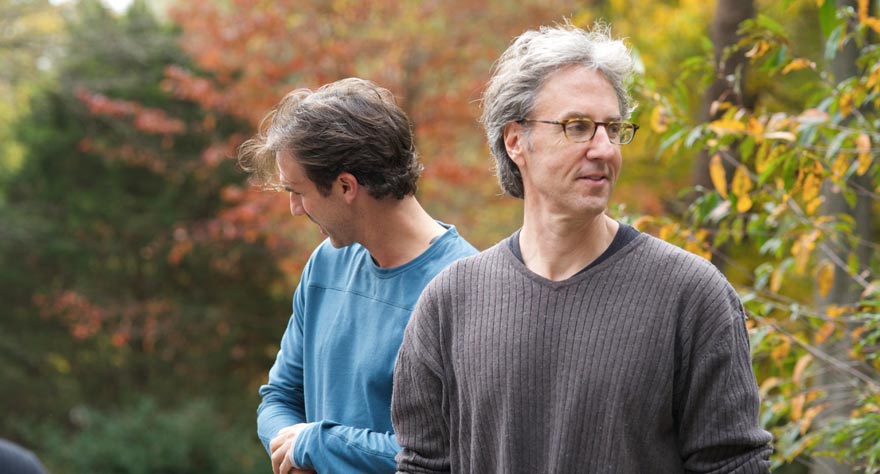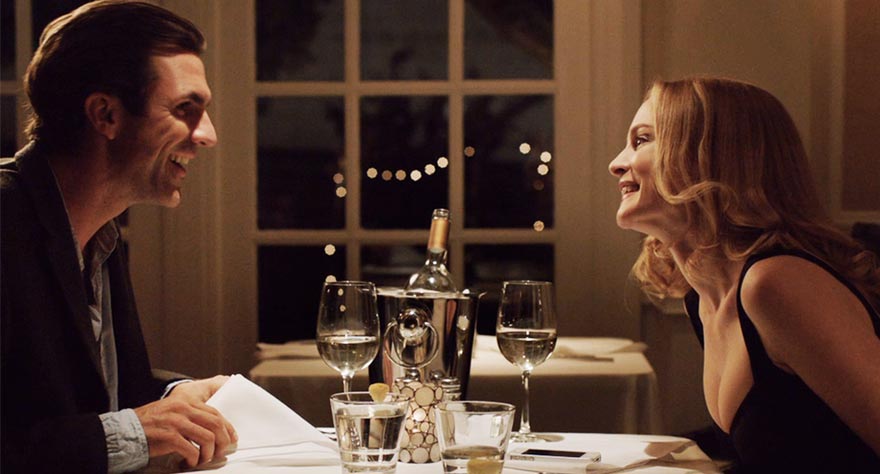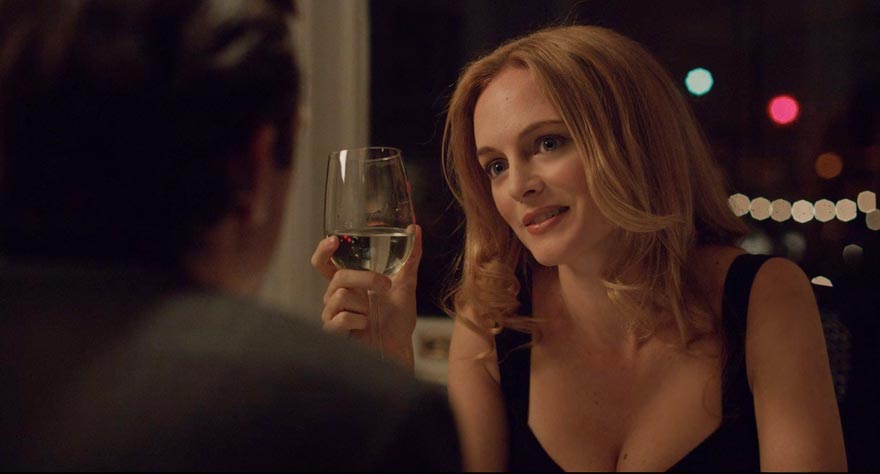‘Junebug’ Screenwriter Angus MacLachlan On His Directorial Debut ‘Goodbye to All That’

Angus MacLachlin first became a name in the independent film world when his debut feature screenplay for Junebug helped turn the film into a festival circuit hit in 2005. Angus went on to be nominated for the Independent Spirit Awards’ Best First Screenplay prize. But since 2005, MacLachlin’s credits have come more sparingly. Nearly a decade since Junebug, the sometimes actor and playwright has moved into the director’s chair with Goodbye to All That. Based on a screenplay he wrote, the film premiered at this year’s Tribeca Film Festival where its star Paul Schneider won the Best Actor prize.
In anticipation of Goodbye to All That’s NYC theatrical and VOD release on December 17th, I sat down with Angus MacLachlin to talk about the inspiration for the divorce story told in his film, his appreciation for actors in small roles, and the 1970s films that inspired him to become a filmmaker.
When did you first start work on Goodbye to All That?
I think it was three years ago when I first started writing it and it took a while, I didn’t know if it was going to come together. Then we shot it actually two years ago, we started in the fall of 2012 and then I edited it that winter and then we waited and got into Tribeca.
What was your initial inspiration that lead you down this path?
It actually came from a number of things that have happened to friends of mine, a number of events that had happened to people I knew that had gone through similar circumstances who would tell me these stories and I would think, “God that’s hard to believe,” or, “That’s funny,” or, “That’s horrifying,” or, “That’s really sad,” or, “That erotic,” so I started making notes.
So it stemmed from friends who had gone through divorce?
Yeah, particularly people I had known who had gone through a divorce. It was sort of that time of life.
All dramedies tend to go kind of heavy in one direction or the other and I think you get a really nice balance of the two. How important was tone to you?
It’s really important and it’s something I never really think about. The films I like the most have both. They’re serious and funny at the same time and I feel that in life, life is like that. When something is really horrible and you kind of suddenly also think it’s funny at the same time. Some people have said that. There’s a funny line I just saw, Lisa Kudrow has this [show] The Comeback, you know? And she talked about, “I did a dramedy, an independent film it was a dramedy. That’s a comedy where the jokes aren’t funny” [laughs]. Sometimes that’s true but I think this, I hope this is actually really funny and also serious.
So when you’re putting together the script are you thinking, “This isn’t funny enough,” or, “This is maybe too funny”?
I never thought it was too funny, I always think more laughs are good. Sometimes someone would say, “You need to punch a couple more jokes in there.” But you know, humor is very interesting. Phil Morrison who directed Junebug and I talk about this a lot how you cannot explain why something is funny to someone who doesn’t think it’s funny. He has an analogy, it’s like a bird trying to describe air to a fish. You know? You can’t say this is funny.
And so sometimes actually with even my producers sometimes I would say, “This is going to be funny. It IS funny.” When an audience finally laughs, I’d say, “See!”

This is your directorial début but you’ve done a lot of screenwriting work in the past, what was it about this project that made you want to direct it?
Well, I had written two other scripts before it that were big, and period pieces that were hard to get made and so I actually wrote this intentionally thinking I’ll write something that could be produced. Usually two people in a room. And then when I wrote it I gave it to Phil Morrison who directed Junebug and he said, “Angus, I think the central emotional component of the film is the father-daughter thing. I don’t have children, and you do, you should direct it.” I gave it to another friend who’s a director and he said the same thing. So when I finally got these producers on hand they said, “Who do you want to direct?” And I said, “If I can get someone as good as Phil that would be great but I’m interested in doing it.” So they thought about it and that’s how it came about.
Is this potentially a launching pad for you to direct those other scripts?
From your mouth to God’s ears [laughs]! Yes, I have another script that I’m ready to go on, I really want to make. You always start at zero, try to find money and producers. By hook or by crook, try to get it made. At the same time I have other scripts that I’ve written that I’d like other people to direct. I have another project that Phil is going to direct.
How different is the experience of filmmaking when you have a little more authorial control on the product? Is it a little more yours?
Yeah. One example is Junebug went into the Cannes Film Festival, I think the Director’s Fortnight. I think that was the section it was in. And they would not let me go. And I said, “Can’t I go?” and they said, “You can go but you can’t see the film and you can’t do anything.” Because that was a first-time filmmaker, they wanted to focus on that, they didn’t want the screenwriter around.
So it’s nice that I get to go to these film festivals now being the director. I love Junebug, I love the way it turned out, I love Phil’s work but some of the things that I’ve written I have not loved them as much. The thing that was most satisfying about this… I was an actor for a number of years, I was a playwright, and I directed in theater. I write with an intention of how it should be done, so I got to complete the process in being the director this time. I got to really say to the actors, “This is the way I think it is, and this is the way I think it should be staged.” So it’s like completing the process. When you write something and it’s not interpreted in the way you imagined it, and it doesn’t work, that can be very frustrating.
How closely does the film resemble what you initially had in mind?
It’s incredible. I got to make the movie I wanted to make which is amazing and I really like it. I even still like to see it, which a lot of directors are like, “I never want to see it again,” but I like to see it, particularly in front of an audience and there’s nothing that I would change, which is pretty amazing. I don’t think it’s the greatest movie in the world but there’s nothing that I would change. This really is the movie I wanted to make.
You get a really great performance out of Paul Schneider, how early on did you know he was going to be the lead?
Not that early. We had a number of people that were presented to us, we had a great casting guy, Mark Bennett who also cast Junebug, and [Paul] was one of the name. Then when he sort of hit I kind of went, “Yeah!” What I like about Paul is he’s so very real and he always seems to be thinking as an actor, even when he’s in the background of a scene, there’s always something going on in his head.
The character was a delicate one to cast because he had to be attractive enough that you’d believe all these women would want to go to bed with him, but not too slick. You know, he had to be believable at being a father, and being a runner. There were a lot of elements that he had to fulfill. I think Paul is terrific in it. Also, I really wanted to cast an actor who you felt liked women as well as wanted to go to bed with them.
He’s a very affable guy; you can see yourself having a conversation with him.
Yeah, and the character is not Paul. He really creates a real character that’s not Paul Schneider, which is also really wonderful. Paul is really with it, and [the character] Otto is not with it in that way. So that’s really great that he created a really complete character.
So it didn’t require coaxing it out of him?
He’s such a smart guy, and he’s directed too. No. We worked really well together and had a really similar concept of who the person was.

You have a lot of very talented actors in the film, and there’s a way you could imagine the film with perhaps lesser known, or lesser quality actors but I think parts with Heather Graham and Amy Sedaris really elevates the film in those stretches. I was wondering how important casting actors as capable as they are was to your process?
Really important! I think because I’m also an actor I always feel for actors who have small roles, you know? And I love to write roles where you could imagine almost a whole movie about those characters. The guy who plays the doctor, and the lawyer, that there’s something that’s not just one note about them. That there’s something that’s a little odd, or funny, or interesting, or intriguing that you can remember.
Or like the therapist, Celia Weston, she makes such an impact and she has like a four-minute scene. People will talk about Celia like, “Oh my God that therapist!” But you want people who can get it and make that impression and make you believe like a good novel, that there’s a lot of characters and a lot of stories aside from just the main story.
When in your life did you know you wanted to be a filmmaker?
The most influential era for me in film was the ‘70s, when I was sort of a pre-teen and a teenager. It was one of the golden ages of film, and I then became an actor and loved theater but I always was so influence by that very realistic era in filmmaking. Hal Ashby and Paul Mazursky and Coppola and all those people who were so great. So when I first started writing I wrote plays because I thought I could produce a play myself, somewhere. But at that time to make a film seemed so kind of out there. Then I stumbled into screenwriting and you know, everybody wants to direct, it’s sort of a cliché, and now I would love to be able to make more films, to direct more films.
It was really, really scary but I found it had utilized so many things I had done before. I was a visual arts major in school and so the visual aspect of it, and being an actor enabled me to feel comfortable talking to actors, and being a parent really helped because being a director a lot of times is like being a dad in a really good mood, you know? [laughs] Dad when he’s enthusiastic and supportive and he’s got an idea, and he’s dependable. You feel safe and you want to have fun. That’s a lot of what I felt my job was as a director.
